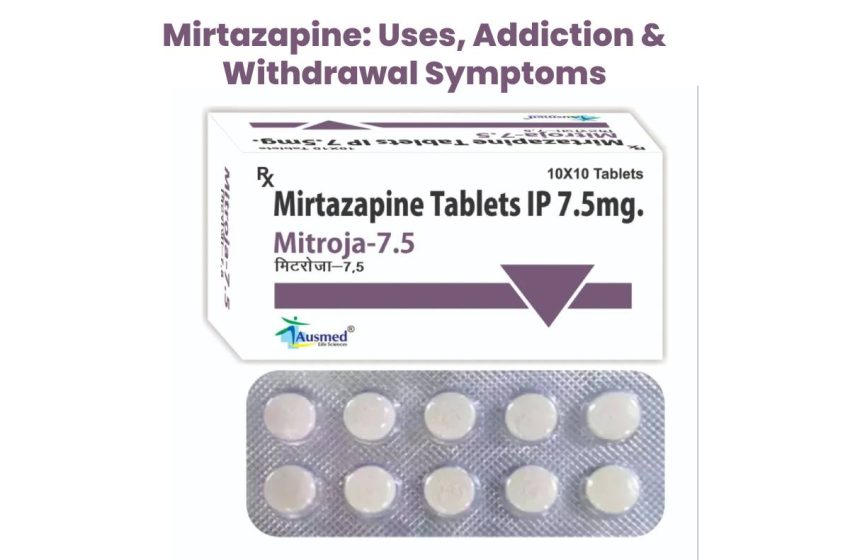Mirtazapine: Uses, Addiction & Withdrawal Symptoms

Mirtazapine is an antidepressant commonly prescribed to treat depression, anxiety, and insomnia. But also used off-label to treat other conditions, such as chronic pain and obsessive-compulsive disorder.
While it can be effective in treating these conditions, there are risks associated with its use.
In this article, we will explore common uses of mirtazapine, identify risk factors for addiction, recognize signs of abuse and withdrawal, and understand tapering off Mirtazapine.
Table of Contents
Understanding Mirtazapine
Mirtazapine (Remeron) is an atypical antidepressant that works by blocking specific brain receptors responsible for regulating mood.
It is commonly prescribed to treat depression, anxiety disorders such as panic or social phobia, and insomnia.
It can also be utilized off-label to treat conditions like chronic pain or obsessive-compulsive disorder (OCD).
Mirtazapine is effective in treating these conditions due to its capability to increase serotonin levels in the brain, which helps regulate mood.
Identifying Risk Factors for Mirtazapine Addiction
Although mirtazapine can effectively treat specific conditions, it has a high potential for abuse and addiction if not taken correctly.
People with a history of substance abuse or addiction are more likely to become addicted to mirtazapine than those who do not have a history of substance abuse or addiction.
Additionally, people who take higher doses of mirtazapine than prescribed by their doctor may be at increased risk of developing an addiction.
Taking mirtazapine with alcohol or other drugs can also increase the hazard of developing an addiction.
Recognizing the Signs of Abuse and Withdrawal
People who are abusing mirtazapine may exhibit signs such as:
- increased agitation or irritability
- changes in sleep patterns
- changes in appetite
- difficulty concentrating
- feelings of restlessness
- increased energy levels
- decreased need for sleep
- cravings for the drug
- taking larger doses than prescribed
- using the medicine without a prescription
- stealing money or drugs from family members or friends;
- Engaging in hazardous behaviors while under the influence of the drug
- feeling unable to function without it
Withdrawal symptoms may include the following:
- nausea/vomiting
- headaches/migraines
- dizziness/lightheadedness
- fatigue/lethargy
- muscle aches/pains/stiffness/tension/cramps
- sweating
- chills
- confusion
- irritability
- anxiety
- insomnia
- nightmares
- loss of appetite
- diarrhea
- tremors
Learning How To Manage Withdrawal Symptoms Safely
If you are experiencing withdrawal symptoms from discontinuing your use of mirtazapine, you must seek medical attention immediately so your doctor can provide appropriate care and advice on managing your symptoms safely.
For example, your doctor may recommend tapering off your dose gradually over time instead of stopping suddenly, which can help reduce the severity and duration of withdrawal symptoms.
Additionally, they may prescribe medications such as benzodiazepines which can help reduce anxiety during detoxification.
Additional treatments, such as cognitive behavioral therapy (CBT), have also been helpful during detoxification from antidepressants.
Tapering Off Mirtazapine
Tapering off Mirtazapine should only be done under close medical supervision since abrupt discontinuation could cause severe withdrawal symptoms.
Your healthcare provider works with you to develop a taper schedule based on individual needs, slowly reducing the dosage until no longer needed.
During this process, they will closely monitor any adverse reactions to ensure safety.
Additionally, they may recommend lifestyle modifications such as dietary changes, exercise, stress reduction techniques, etc., to help manage any remaining withdrawal symptoms after the taper schedule is completed.
A Breakdown Of Mirtazapine: In Closing
Mirtazapine can be a beneficial drug for treating depression and anxiety, but its usage should always be under the guidance of healthcare professionals.
It’s important to note that mirtazapine can cause dependence if used over extended periods, so it should be used cautiously and only as prescribed.
People should also keep an eye out for potential withdrawal symptoms when discontinuing the use of this medication. Remember that tapering off Mirtazapine should only be done with medical supervision.
We hope you found this information to be helpful, and thanks so much for reading.


